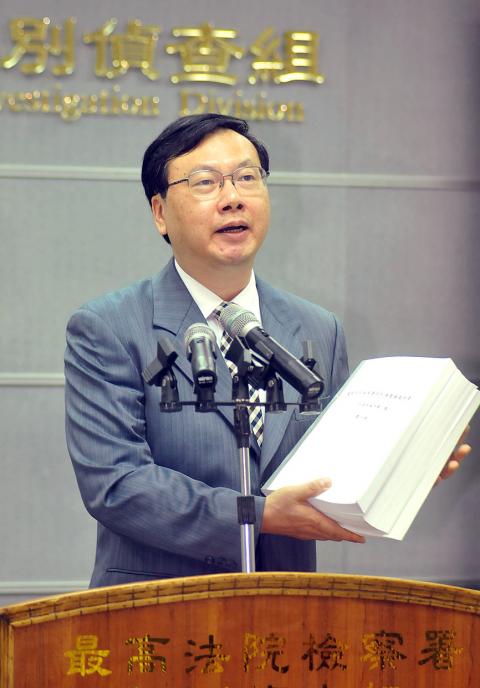Special prosecutors yesterday indicted former president Chen Shui-bian (陳水扁) for illegally seizing confidential government documents, the latest in a series of charges facing Chen, who is already serving a jail sentence for corruption.
Chen was indicted on the charge of violating the Classified National Security Information Protection Act (國家機密保護法), Supreme Prosecutors’ Office Special Investigation Division (SID) members said.
However, because Chen never released any of the documents to the public, prosecutors recommended that the court give the former president a relatively light sentence proportionate to the crime.

Photo: CNA
According to the indictment, Chen ordered close aides to pack and transport important documents from national security agencies, the Ministry of National Defense and the Ministry of Foreign Affairs to his personal office in Taipei after the March presidential election in 2008, when Chen’s Democratic Progressive Party was voted out of power.
Prosecutors said that after searches, inspectors discovered the former president had taken more than 17,000 documents, 3,419 of which were classified.
SID inspectors questioned people linked to the case 43 times and Chen himself at Taipei Prison, where he has been serving a 17-and-a-half-year sentence since late 2010.
While Chen told prosecutors he did not know how his aides handled the documents and that as president he had the right to destroy them, prosecutors said in the indictment it was against the law for him not to return the documents after leaving office on May 20, 2008.
The prosecutors alleged that Chen kept the documents for several reasons — to help him write a planned memoir and prepare for lawsuits in which he was involved and to collect evidence against other politicians.
The former president’s office yesterday afternoon called the indictment ridiculous and unfounded, adding that the fact that it was made one day after President Ma Ying-jeou’s (馬英九) inauguration raised serious questions about the SID’s motives. Chen’s office denied having done anything illegal and called for the abolishment of the SID, saying it was unworthy of the public.
Chen’s attorney, Cheng Wen-lung (鄭文龍), described the indictment as “political suppression.”
Cheng said the SID should be cracking down on irregularities involving incumbent government officials rather than on the former president, citing problems related to the production of an expensive musical, called Dreamers (夢想家), for the Republic of China centennial celebration last year, as well as the 2010 Taipei International Flora Expo.
Cheng also said that because the office of a former president is also defined as a public institution, Chen’s action could simply be described as moving the files from one public institution to another.
“It does not involve illegal conduct or corruption,” he said.
Additional reporting by Lee Hsin-fang

CHAOS: Iranians took to the streets playing celebratory music after reports of Khamenei’s death on Saturday, while mourners also gathered in Tehran yesterday Iranian Supreme Leader Ayatollah Ali Khamenei was killed in a major attack on Iran launched by Israel and the US, throwing the future of the Islamic republic into doubt and raising the risk of regional instability. Iranian state television and the state-run IRNA news agency announced the 86-year-old’s death early yesterday. US President Donald Trump said it gave Iranians their “greatest chance” to “take back” their country. The announcements came after a joint US and Israeli aerial bombardment that targeted Iranian military and governmental sites. Trump said the “heavy and pinpoint bombing” would continue through the week or as long

TRUST: The KMT said it respected the US’ timing and considerations, and hoped it would continue to honor its commitments to helping Taiwan bolster its defenses and deterrence US President Donald Trump is delaying a multibillion-dollar arms sale to Taiwan to ensure his visit to Beijing is successful, a New York Times report said. The weapons sales package has stalled in the US Department of State, the report said, citing US officials it did not identify. The White House has told agencies not to push forward ahead of Trump’s meeting with Chinese President Xi Jinping (習近平), it said. The two last month held a phone call to discuss trade and geopolitical flashpoints ahead of the summit. Xi raised the Taiwan issue and urged the US to handle arms sales to

State-run CPC Corp, Taiwan (CPC, 台灣中油) yesterday said that it had confirmed on Saturday night with its liquefied natural gas (LNG) and crude oil suppliers that shipments are proceeding as scheduled and that domestic supplies remain unaffected. The CPC yesterday announced the gasoline and diesel prices will rise by NT$0.2 and NT$0.4 per liter, respectively, starting Monday, citing Middle East tensions and blizzards in the eastern United States. CPC also iterated it has been reducing the proportion of crude oil imports from the Middle East and diversifying its supply sources in the past few years in response to geopolitical risks, expanding

An Emirates flight from Dubai arrived at Taiwan Taoyuan International Airport yesterday afternoon, the first service of the airline since the US and Israel launched strikes against Iran on Saturday. Flight EK366 took off from the United Arab Emirates (UAE) at 3:51am yesterday and landed at 4:02pm before taxiing to the airport’s D6 gate at Terminal 2 at 4:08pm, data from the airport and FlightAware, a global flight tracking site, showed. Of the 501 passengers on the flight, 275 were Taiwanese, including 96 group tour travelers, the data showed. Tourism Administration Deputy Director-General Huang He-ting (黃荷婷) greeted Taiwanese passengers at the airport and